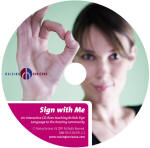This course has been developed from a multi-national EU funded project under the "Social Exclusion Programme". The course uses British Sign Language (BSL) and was designed for the hearing impaired of any age. The course includes over 57 essential phrases.
The
course is a unique and totally new approach to teaching Sign.
Designed for use by members of the hearing community, the course
uses a series of 57 video clips to show the learner exactly how
key words and phrases can be used to communicate with the deaf.
Created for use by personnel including receptionists,
doctors, nurses, waiters, waitresses, retail and travel staff,
the course aims to break through the barriers often created
through misunderstandings between the deaf and hearing
communities. Supported by sections designed to make signing fun.
The European Union part funded the development of this basic
on-line Sign Language course, available in British Sign Language
(BSL) for those people who will come in to contact with people
with a hearing disability so they will be able to communicate
effectively with them – this could be family members, employers
or trainers. Deafness has the effect of isolating the individual
from society both economically and socially.
The project aims to reduce exclusion and, using the latest communication technologies, encourage societal mainstreaming and integration of the individual to enable him/her to work and/or train alongside their able bodied peers.
Areas covered are:
(1) Healthy Living (2) Eating
Out (3) Travelling
(4) In the Workplace (5) Shopping
(6) School/College
|
Please Note: The downloadable course is NOT compatible with Apple Mac operating systems. |
T
This project has been funded with support from the European Commission. This webpage reflects the views only of the author, and the Commission cannot be held responsible for any use which may be made of the information contained therein.

5.95 GBP
(invoicing administered by EU15 Ltd)
For example if a deaf person wants
to undertake a training course they need to be able to
communicate with someone at the local College to explain their
needs. The first contact will be with the Reception desk.
Without some basic knowledge of sign language the receptionist
will not be able to help - the deaf person with a mental health
problem will then have to wait until someone with Sign language
skills is available. They may not be able to wait and the
frustrating experience may lead them not to bother pursuing the
training course.
If, however, the Receptionist is able to communicate (albeit in
a basic way) this will ensure that the deaf person is dealt with
effectively and sympathetically.
